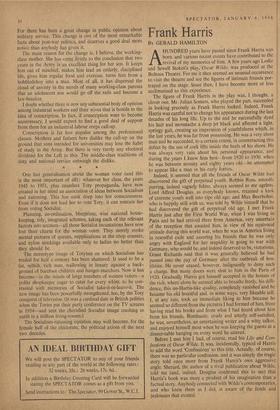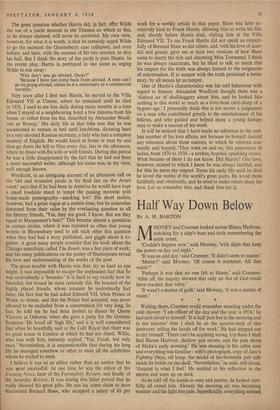Frank Harris
BY GERALD HAMILTON A' HUNDRED years have passed since Frank Harris was born, and various recent events have contributed to the revival of my memories of him. A few years ago Leslie and Sewell Stokes's play, Oscar Wilde, was produced at the Boltons Theatre. For me it then seemed an unusual occurrence to visit the theatre and see the figures of intimate friends por- trayed on the stage. Since then, I have become more or less acclimatised to this experience.
The figure of Frank Harris in the play was, I thought. a clever one. Mr. Julian Somers, who played the part, succeeded in looking precisely as Frank Harris looked. Indeed, Frank Harris was careful not to change his appearance during the last decades of his long life. Up to the end he successfully dyed his hair and moustache a deep jet black and affected a light. springy gait, creating an impression of youthfulness which,. in the last years, he was far from possessing. He was a very short man'and he succeeded, to a certain extent, in counteracting this defect by the use of cork lifts inside the heels of his shoes. He was always very vain about his personal appearance, and during the years I knew him best—from 1920 to 1930. when he was between seventy and eighty years old—he attempted to appear like a man in his early forties.
Indeed, it. seemed that all the friends of Oscar Wilde had discovered the gift of perpetual youth. Robbie Ross. smooth. purring, indeed vaguely feline, always seemed to me ageless. Lord Alfred Douglas, as everybody knows, retained a look of extreme youth well into ripe old age; and Max Beerbohm. who is happily still with us, was told by Wilde himself that he had discovered the gift of perpetual old age. I met Frank Harris just after the First World War, when I was living in Paris and he had arrived there from America, very uncertain of the reception that 'awaited him, in view of his equivocal attitude during this world war, when he was in America living in resentful exile and assuring his friends that he was only angry with England for her stupidity in going to war with Germany, who would be, and indeed deserved to be, victorious. Grant Richards said that it was generally believed he had passed into the pay of Germany after the outbreak of hos- tilities. He never ceased, however, 'indignantly to deny such a charge. But many doors were shut to him in the Paris of 1920. Gradually Harris got himself accepted in the houses of the rich, where alone he seemed able to breathe freely, his diffi- dence, this un-Harris-like quality, completely vanished and he became his old boastful and. in some ways, very likeable self. I, at any rate, took an immediate liking to him because he seemed so different from the pictures I had formed of him, from having read his books and from what I had heard about him from his friends. Bombastic. crude and utterly self-satisfied, he was, nevertheless, an entertaining writer and a witty talker. 1 and.enjoyed himself most when he was keeping the guests at a dinner-table hanging on every word he uttered.
Before I met him 1 had, of course, read his Life and Con- fessions of Oscar Wilde. It was, incidentally, typical of Harris to add the word 'Confessions' to this title. Actually, of course. there was no particular confession, and it was simply the tragic story told once more from Frank Harris's own aggressi% e angle. Sherard, the author of a rival publication about Wilde. told me (and, indeed. Douglas confirmed this to me) that Harris's book was more a product of his imagination than a factual story. Anybody connected with Wilde's contemporaries. and who knew them as I. did, is aware of the feuds and jealousies that existed. The great question whether Harris did, in fact, offer Wilde the use of a yacht moored in the Thames on which to flee, as he always claimed, will never be answered. My own view, however, for what it is worth, is that he certainly urged Wilde to go the moment the Queensberry case collapsed, and even before; and later, with the consent of his two sureties, to skip his bail. But I think the story of the yacht is pure Harris. In the recent play, Harris is portrayed in one scene as urging Wilde to run away : 'Why don't you go abroad, Oscar?' 'Because I have just come back from abroad. A man can't go on going abroad, unless he is a missionary or a commercial traveller.'
Very soon after I first met Harris, he moved to the Villa Edouard VII at Cimiez, where he remained until he died in 1931. I used to see him daily during many months at a time when I stayed at a neighbouring hotel a few minutes from his house, or rather from his flat, described by Alexander Wooll- cott as 'frowzy.' His daily life at that time was that he was accustomed to remain in bed until lunchtime, dictating hard to a very devoted Russian secretary, a lady who had a complete mastery of English. He would lunch at home or near by and then go down the hill to Nice every day, late in the afternoon, where he dined with his wife or with friends. During this period he was a little disappointed by the fact that he had not been a more successful writer, although his name was, in my view, well enough known.
Woollcott, in an intriguing account of an afternoon call on the 'old and wounded pirate in his final lair on the Azure coast,' says that if he had been in'America he would have kept a small roadside stand to tempt the passing motorist with home-made pornography—smoking hot! His short stories, however, had a great vogue at a certain time, but he somewhat detracted from their value by the everlasting question to all his literary friends, 'Yes, they are good, I know. But are they equal to Maupassant's best?' This became almost a quotation in certain circles, where it was repeated so often that young writers in Bloomsbury used to ask each other this question when they had had a story published, and giggle about it to- gether. A great many people consider that his book about the Chicago anarchists, called The Bomb, was a fine piece of work; and his tnany publications on the poetry of Shakespeare reveal his love and understanding of the works of the poet.
The great trouble with Harris was that, try as hard as one might, it was impossible to escape.the unpleasant fact that he was undoubtedly a 'bounder.' It is hard to say exactly how he bounded, but bound he most certainly did. He boasted of the highly placed friends, whose intimate he undoubtedly had been; the fact that he bad asked Edward VII;when Prince of Wales, to dinner, and that the Prince had accepted, was never allowed to be excluded from a conversation for very long. In fact, he told me he had been invited to dinner by Queen Victoria at Osborne, when she gave a party for the German Emperor. He loved all 'high life,' and it is well remembered that when he boastfully said at the Cafe Royal that there was no great house in London at which he had not dined, Wilde, who was with him, instantly replied, 'Yes, Frank, but only once.' Nevertheless, it is unquestionable that during his long life he managed somehow or other to meet all the celebrities whom he wished to meet.
• I believe it was as an editor rather than an author that he was most successful. At one time he was the editor of the Evening News, later of the Fortnightly Review, and finally of the Saturday Review. It was during this latter period that he really showed his great gifts. He can lay some claim to hai'e discovered Bernard Shaw, who accepted a salary of £6 per week for a weekly article in that paper. Shaw was later ex- cessively kind to Frank Harris, allowing him to write his life, and, shortly before Harris died, visiting him at the Villa Edouard VII. To me Frank Harris did not speak so respect- fully of Bernard Shaw as did others, and, with his love of scan- dal and gossip, gave me at least two versions of how Shaw came to marry the rich and charming Miss Townsend. I think he was always inaccurate, but he liked to talk so much that his respect for the truth was always limited to the exigencies of conversation. If to tamper with the truth produced a better story, by all means let us tamper.
One of Harris's characteristics was his odd behaviour with regard to finance. Alexander Woollcott thought there was a 'distinct air of skullduggery about him, and he looked like nothing in this world so much as a river-boat card-sharp of a bygone age.'. I personally think this is too severe a judgement on a man who contributed greatly to the entertainment of his fellows, and who guided and helped many a young literary man to make a success of his work.
It will be noticed that I have made no reference to the end- less number of his love affairs, not because he himself desired any reticence about these matters, to which he referred con- stantly and happily.'They want on and on, this procession of ladies, from 1870 to 1930—a tireless, hopeful, sparkling crowd. What became of them I do not know. Did Harris'? One love, however, existed to which I know he was always faithful, and for this he earns my respect. From his early life until he died he loved the works of the world's great poets. He loved them faithfully and obediently, and he tried to make others share his love. Let us remember this, and thank him for it. ,



































 Previous page
Previous page